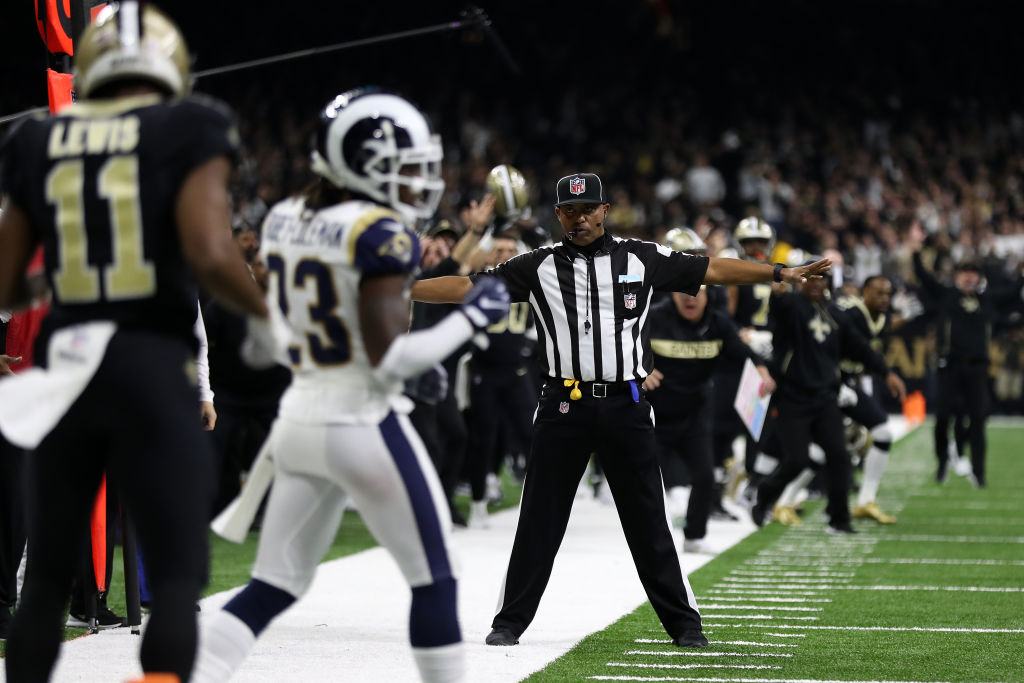NFL
Do NFL Referees Ever Get Penalized for Bad Calls?

One of the most pressure-packed jobs in all of sports is the position of NFL referee. You have tens of thousands of eyes on you in the stadium and exponentially more watching at home on TV, waiting for a mistake to boo. But how does the NFL grade its officials? Do they ever get penalized for bad calls? Let’s take a closer look at how the league holds its officials accountable for their performance.
How NFL referees are assigned to each game
Most NFL referees are assigned to a specific crew who they travel with for the entire season. There are 17 officiating crews in all. Each crew is made up of seven on-field officials with an additional replay official and replay assistant as well. The on-field positions include:
- Referee: the crew chief
- Umpire: monitors line of scrimmage for blocking and holding. Also responsible for player equipment and counting offensive players.
- Down judge: oversees line of scrimmage and the chain crew. Looks for offside and encroachment penalties.
- Line judge: opposite from the down judge, monitors other side of the line of scrimmage. Also looks for offside and encroachment penalties.
- Field judge: Watches receivers and sidelines to determine if players are in and out of bounds.
- Side judge: serves as backup to the clock operator and signals when time has expired.
- Back judge: responsible for players at the end of the line of scrimmage such as tight ends.
Each referee has a specific set of responsibilities they need to master during the course of the game. Several “swing” referees are also available to step in when needed.
The NFL’s evaluation system for officials
Bleacher Report reached out to former NFL referee Jerry Frump several years ago for an analysis of how the NFL judges its officials. The answer he gave may surprise fans who think NFL referees are beyond reproach. They’re actually watched incredibly closely by the league and evaluated based on their performance on a play-by-play basis:
“‘The NFL has a very sophisticated evaluation system,’ Frump told me. ‘Every single play is graded.’
Every week, Frump told me, every official’s performance on every play is reviewed by league staff members with on-field officiating experience. Further, Frump said, there’s ‘a live evaluation being done by somebody on-site,’ and the report from the observer is taken into account along with the film study grades.”
Frump also said that a third party provides grades of the officials and gives these back to the crew chief for review.
In an era where every game is televised and plays can be dissected by millions of people within seconds via social media, refs are under more scrutiny than ever. The NFL is sensitive to this fact which no doubt plays into how closely the refs are evaluated.
The fact of the matter is though, the NFL just wants their refs to get the calls right. By grading how well each individual ref is able to correctly call each play, they see which refs are the best and the worst at coming to the right determination.
Do NFL referees ever get penalized for bad calls?
There are a few ways the NFL can penalize its referees. One is that they can be held out from postseason play. Typically, the highest-graded referees move on to officiate the postseason. That means that if an official consistently receives below-average grades, they won’t get the opportunity to officiate playoff games.
There are rare instances in which the NFL has fired a referee for a particularly egregious call. Referee Hugo Cruz missed a blatant false start against Los Angeles Chargers’ offensive lineman Russell Okung in a game against the Pittsburgh Steelers. The penalty was so obvious that the NFL took near-immediate action, firing him the next day.
While the NFL and its referees get quite a lot of criticism, there is a system in place that allows for accountability.











